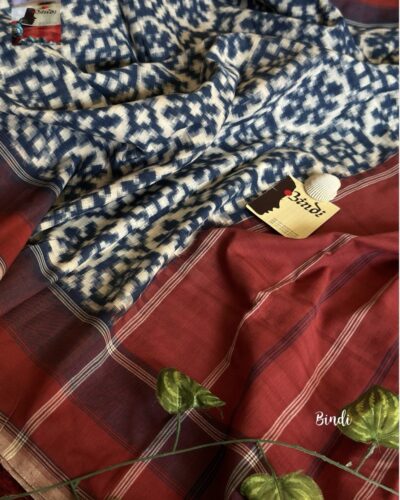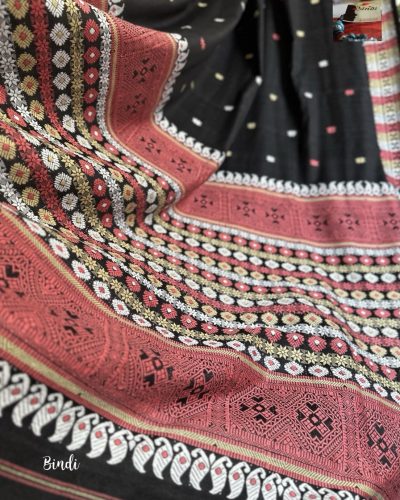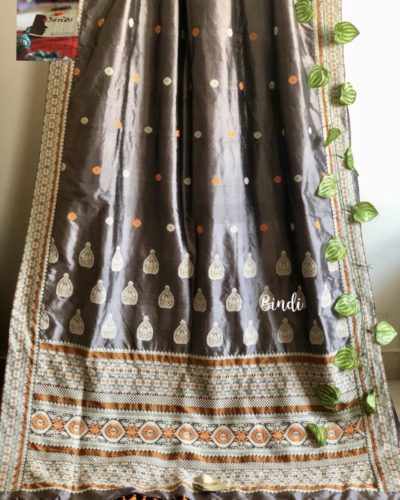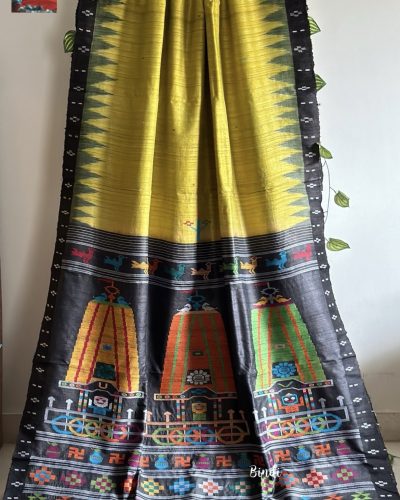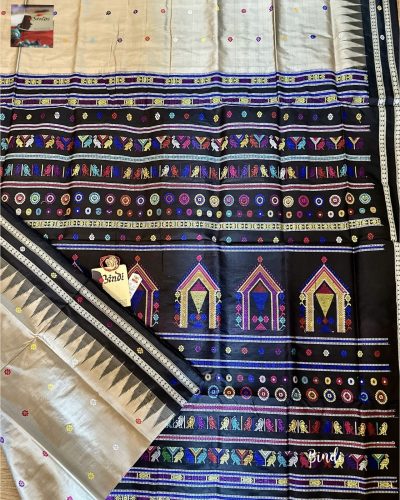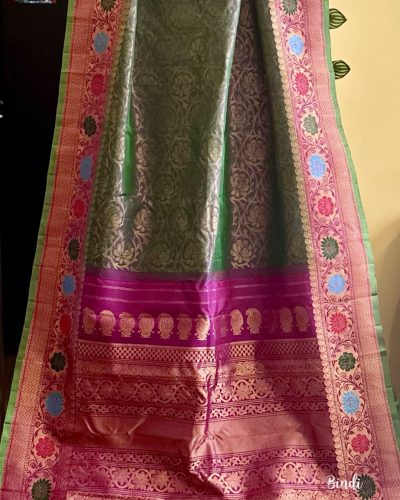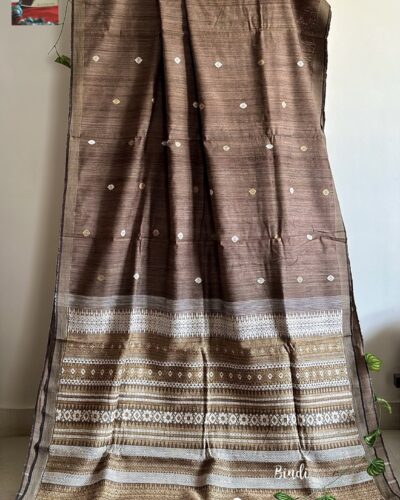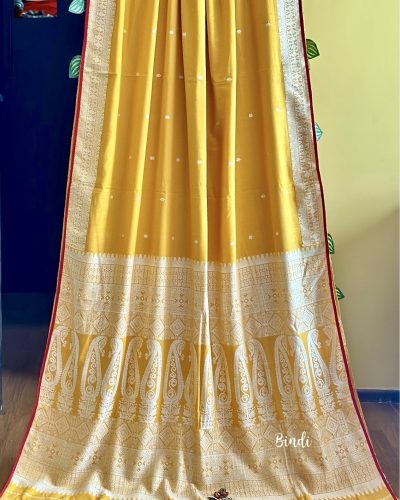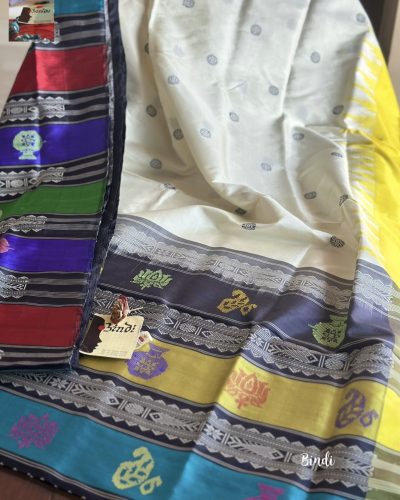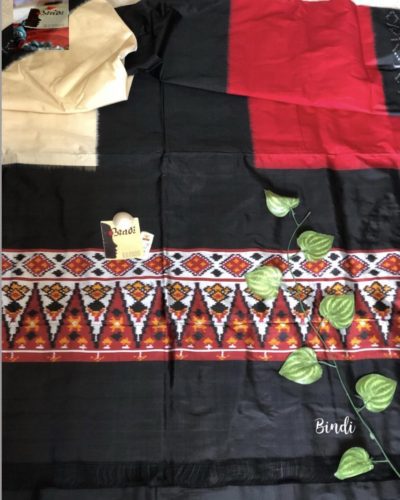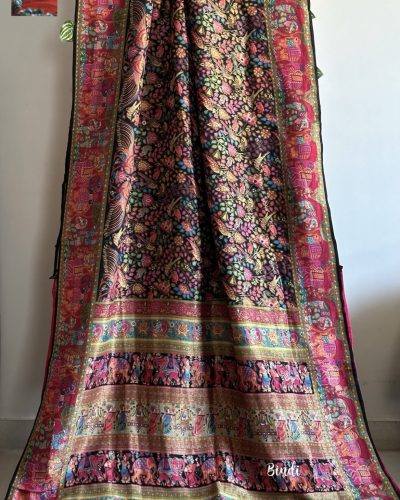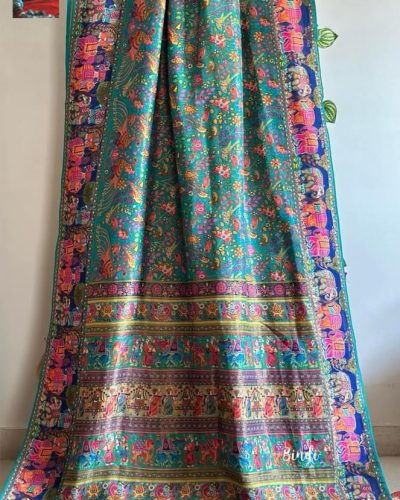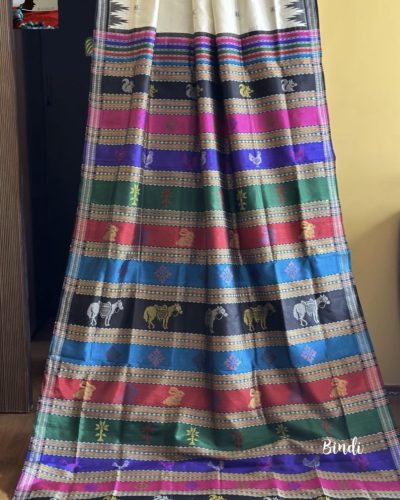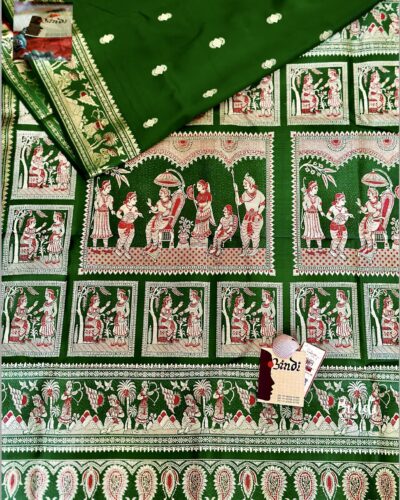-
Sold out!
THE NATURE’S SYMPHONY II – NATURAL DYED DOUBLE IKAT TELIA COTTON SAREE
NATURAL DYED DOUBLE IKAT TELIA COTTON SAREE
Double Ikkat of Andhra Pradesh is an integral part of Indian weave- craft tradition and Telia Rumal being the genesis to that. AP is the most prolific producer of this magnificent ikkat style technique of Telia. Here natural dyes are extensively utilized, keeping it true to the concept of traditional methods. The major processing of Natual Dyed complex Telia motif fabrics requires skilled hands and indigenous knowledge. We are super excited to showcase these fascinating sarees for the first time.Saree length 6.3 mts including blouse piece
₹23,800.00 -
Krishnokoli – Handwoven Eri by Paat Silk Saree from Assam
The Silk Village of Assam
Sualkuchi, a quaint village not very far from Guwahati, the largest city of Assam. This picturesque village, however, is heaven for silk fabrics, and is known as the ‘Manchester of East’ as well as the ‘Weaving Mecca of Assam’.
Sualkuchi silk earns GI tag. Sualkuchi offers various silk fabrics to the world, including the golden Muga, ivory white pat, and light beige eri or endi silks.Saree Description:
Eri silk x mulberry Silk Saree.Eri Silk is used in design Motifs.
Saree length 6.4 mts including blouse piece₹23,850.00₹26,500.00Save: ₹2,650.00
Krishnokoli – Handwoven Eri by Paat Silk Saree from Assam
₹23,850.00₹26,500.00Save: ₹2,650.00
Add to cart -
Barkha – Handwoven pure Paat silk from Assam
Handwoven pure Paat silk (mulberry) woven with Eri thread from Assam
Saree length 6.4 mts including blouse₹23,950.00₹27,950.00Save: ₹4,000.00
-
Rathayatra – Handwoven Handspun Gopalpur Tussar Saree
Ratha Jatra, the most magnificent Festival of Chariots of Lord Jagannatha is celebrated every year in Puri. Bindi brings to you an exclusive Pure natural dyed handspun desi Tussar Phoda kumbha Saree, Lord Jagannath, Balaram & Subhadra woven on pallu from our very own Gopalpur village of Odisha.
Saree length 6.5 mts including contrast blouse piece
₹24,000.00 -
SIMANTINI II ~ DOLABEDI SILK FROM ODISHA HANDLOOM
If we consider our country as the textile hub of the world, then undoubtedly Odisha would be the largest producer of ethnic weaves! Bindi is a bit obsessed with the rich Handloom heritage of Odisha for sure and every time we add a gem to our collection, we receive amazing response from you all ! The mesmerizing quality of the fabrics, vibrant color palate, intricate techniques to depict the detailed motifs – every Odisha saree is exquisite in its own way. We can’t express our appreciation and gratitude more towards the numerous clusters of the artisans, who help sustain the textile value chain since hundreds of years in India ! Here’s presenting our gorgeous #Dolabedi collection. Its design is a rare combination of earthy patterns and ancient temple architectural style. Gracefully embrace it to make your unmistakable fashion statement !!
Handwoven Full Body Double Ikkat 4 ply (mulberry silk) Dolabedi Silk Saree with blouse piece
Saree length 5.5 mts blouse piece 90 cm₹24,000.00 -
TUNGABHADRA I ~ PURE HANDWOVEN Brocade GADWAL Silk Saree
Handwoven blue and green dual tone brocade Gadwal all over weaving body and border contrast blouse piece
Saree length 6.3 mts including blouse piece₹24,295.00₹26,995.00Save: ₹2,700.00
TUNGABHADRA I ~ PURE HANDWOVEN Brocade GADWAL Silk Saree
₹24,295.00₹26,995.00Save: ₹2,700.00
Add to cart -
Sold out!
Khoai – Handwoven Eri Silk By Tussar Saree from Assam
Sualkuchi: The Silk Village of Assam
Just a handful of us may have heard of Sualkuchi, a quaint village not very far from Guwahati, the largest city of Assam. This picturesque village, however, is heaven for silk fabrics, and is known as the ‘Manchester of East’ as well as the ‘Weaving Mecca of Assam’.
Sualkuchi silk earns GI tag. Sualkuchi offers various silk fabrics to the world, including the golden Muga, ivory white pat, and light beige eri or endi silks.Saree Description:
Tussar x Eri Silk Saree. Eri silk & Muga Gicha Silk is used in design Motifs.
Saree length 6.4 mts including blouse piece₹24,500.00₹26,950.00Save: ₹2,450.00
-
Sold out!
Basant Bahar – Handwoven Pure Eri By Eri silk saree
Handwoven Pure Eri (ahimsa) silk from Saulkuchi, Assam
Eri silk is a type of peace silk produced by the domesticated silkworm Samia ricini. The word Eri is derived from era, the Assamese word for castor and is made from worms that feed on the leaves of the castor oil plant.
Eri silk sarees are also known as ahimsa silk sarees. The term “ahimsa” is a Sanskrit word that literally translates to “non-violence”. Eri silk is a type of silk that is produced without killing the silkworm, making it a cruelty-free alternative and a popular choice for people who are concerned about animal welfare.Add an elegant note to your wardrobe with buttery soft Eri silk sarees that drapes like a dream.
Saree Description:
Eri silk x Eri Silk Saree.Eri Silk is used in design Motifs.
Saree length 6.4 mts including blouse piece₹24,650.00 -
Sold out!
NAIVEDYAM III ~ BERHAMPUR DOUBLE PATTA PURE SILK SAREE
BERHAMPURI Patta (double Anchal / pallu) Pure Silk with Ganga Yamuna border
The Berhampuri silk saree (also known as Phoda Kumbha weaving because of its characteristic temple design) is different from all others Odisha Handloom sarees. The weaving technique is said to have originated over 200 years ago and exported to various parts of the globe through the Gopalpur port in the days of yore. These majestic sarees also adorn the deities of Lord Jagannath, Balabhadra and Subhadra at the temple of Puri! For the lovers of Indian Handloom, Berhampuri Patta or double pallu silk sarees are more than treasured jewels, hope you will appreciate this beauty just as we do.
Saree length 6.5 mts including blouse piece₹24,950.00 -
Mritrani ~ Double Ikat Pochampally Pure silk
A very traditional double ikkat Pochampally pure silk saree from Telangana
Saree length 6.3 mts including blouse piece
₹24,950.00 -
Sold out!
ASHAVALI Jaal (Black) – HANDWOVEN PURE SILK FROM GUJARAT
Ashavali (Jaal)
Handwoven Pure Mulberry silk with all over jaal brocade weaving saree from Gujarat
Saree length 5.5 mts
Blouse Piece 1 mt₹24,950.00 -
Sold out!
ASHAVALI JAAL – HANDWOVEN PURE SILK FROM GUJARAT
Ashavali (Jaal)
Handwoven Pure Mulberry silk with all over jaal brocade weaving saree from Gujarat
Saree length 5.5 mts
Blouse Piece 1 mt₹24,950.00 -
Sold out!
ASHAVALI JAAL (white) – HANDWOVEN PURE SILK FROM GUJARAT
Ashavali (Jaal)
Handwoven Pure Mulberry silk with all over jaal brocade weaving saree from Gujarat
Saree length 5.5 mts
Blouse Piece 1 mt₹24,950.00 -
Sold out!
-
FREE BIRD (Green) – HANDWOVEN PURE KATAN GOLANI BALUCHARI SAREE
They say mythology is not only about the old stories but it is about the belief contained in them. The beliefs when narrated to us in an interesting way, build our value systems.
This one of a kind Baluchori depicts such a story that is long forgotten but conveys an immensely powerful message.
This is a story of prince Siddhartha, who would change the world as Gautam Buddha in his later life. It is woven so beautifully that we were spellbound by the fineness of the work, which almost resembled a painting. The technique used here is ‘Golani’ and the story goes like this –One morning Prince Siddhartha and his cousin Devadatta, went for a walk in the woods. Siddhartha pointed out a swan flying in the sky to Devadatta. Before Siddhartha could stop him, Devadatta shot an arrow at it.
Struck by the arrow, the bird went down. Both the boys ran towards it. Siddhartha was the first to reach the spot. He picked up the bird, gently removed the arrow, and nursed its wound. Just then Devadatta reached the spot. “Give me the bird, it’s mine,” said Devadatta. Siddharth refused to part with the bird. Devadatta took his cousin to court for justice.
“I shot the arrow and brought the bird down. It belongs to me,” said Devadatta.
“I nursed its wound,” said Siddhartha.
The judge looked at the bird Siddhartha was holding.
“Had the bird been killed by your arrow, you could have claimed it,” said the judge. “But Siddhartha saved it. The bird belongs to the one who saved it, and not to the one who tried to kill it,” said the wise judge.
By that time the wound had healed, and the bird had fully recovered. Siddhartha went out and let the bird go. “The bird is free. It belongs to no one,” said Siddhartha as he watched the swan fly high in the air.
So relevant in today’s world isn’t it? When will a day come when all humans and creatures will be set free in our planet.. free from the exploitation of greedy power mongers?
A story to ponder over… a saree to treasure forever…Saree length 6.3 mts including blouse piece
₹25,000.00
- SALE
- SAREES
- Tussar
- Silk
- Ajrakh Gajji
- Ajrakh Modal
- Assam
- Baluchari
- Banarasi Katan
- Banarasi Organza
- Berhampur
- Chanderi
- Dolabedi
- Gadwal
- Hand Batik
- Hand Block Print
- Himroo
- Kantha
- Kanjivaram
- Kanchipuram
- Khaddi Georgette
- Kalamkari
- Khandua
- Lambani
- Mulberry
- Madhubani Hand Painting
- Muslin
- Matka
- Organza
- Odissa
- Paithani
- Patola
- Pochampally Ikkat
- Pochampally Soft
- Raw Silk
- Shibori
- Swarnachori
- Swarnokatan
- Cotton
- Silk cotton
- Linen
- Dhakai Jamdani
- Apparel
- Jewelries
- About Us
- Contact



